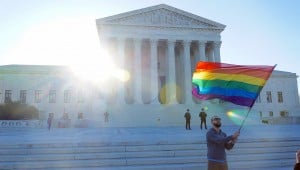
(Ted Eytan / Flickr)
A basic fact of appellate litigation is that not every case makes it to the Supreme Court. Indeed, lots of cases get denied certiorari. But when the denial leaves in place a law called “easily the most sweeping anti-LGBTQ bill passed since the Supreme Court struck down same-sex marriage bans nationwide in 2015,” well, Court watchers have to wonder just how far to the right the appointment of Neil Gorsuch has swung the Court.
Today the Supreme Court turned away — without comment — challengers to Mississippi’s HB 1523 in Barber v. Bryant and Campaign for Southern Equality v. Bryant. The law codifies the following three beliefs as religious: that marriage is only between a man and a woman; that sexual relations are confined only to marriage; and that sex is an immutable characteristic assigned at birth, thereby allowing discrimination against gay, lesbian, and transgender individuals.
As Mark Joseph Stern at Slate notes, the consequences for LGBTQ folks in Mississippi can be far reaching:
Under HB 1523, anyone who acts upon these beliefs receives total immunity from legal action. Landlords may evict gay and trans renters. Employers may fire LGBTQ workers. Private and state-run adoption agencies can turn away same-sex couples. Clerks and judges can refuse to marry same-sex couples. A doctor can refuse to counsel or treat an LGBTQ patient. And private businesses can refuse to serve LGBTQ people if doing so somehow involves “recognition of” a same-sex marriage. A gay couple who attempts to celebrate their anniversary with a nice dinner in Mississippi can be lawfully ejected from the restaurant.
As Law.com reports, the reaction from activists has been one of disappointment:
“The court’s inaction today means that LGBTQ Mississippians will continue to face harassment and discrimination,” said Masen Davis, head of Freedom for All Americans, a bipartisan campaign to secure nondiscrimination protections for LGBTQ persons. “HB 1523 fails to honor the tradition of religious freedom in America—instead, it allows people to use religion as a license to discriminate.”

How LexisNexis State Net Uses Gen AI To Tame Gov’t Data
Its new features transform how you can track and analyze the more than 200,000 bills, regulations, and other measures set to be introduced this year.
The two cases were led by legal heavy-hitters — the Barber challenge by Munger Tolles’s Don Verrilli while the Campaign for Southern Equality case was brought by Roberta Kaplan of Kaplan & Co., but that still didn’t change the outcome. The Fifth Circuit’s ruling in the Barber case held the plaintiffs lacked specific harm and therefore standing to sue, since the district court’s injunction had prevented the law from taking effect.
One can certainly hope that the yet-to-be-decided Masterpiece Cakeshop v. Colorado Civil Rights Commission case will provide some measure of protection for the petitioners in the Mississippi cases, but it will still cause a good deal of worry until that decision is in hand.
 Kathryn Rubino is an editor at Above the Law. AtL tipsters are the best, so please connect with her. Feel free to email her with any tips, questions, or comments and follow her on Twitter (@Kathryn1).
Kathryn Rubino is an editor at Above the Law. AtL tipsters are the best, so please connect with her. Feel free to email her with any tips, questions, or comments and follow her on Twitter (@Kathryn1).
